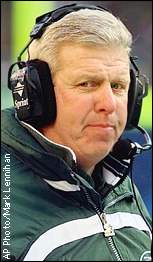 |
Saturday, Jan. 16 4:34am ET Jets rise by focusing on the present |
||
|
Associated Press
DENVER -- One and fifteen, 1 and 15, 1-15. No matter how
they're written, the numbers of the '96 New York Jets were ugly.
Justifiably so -- they were an ugly team, the laughingstock of
pro football.
Their training camp was more like a vacation retreat that
summer. Coach Rich Kotite seemed more eager to get to the golf
course than hold practices.
The team's strategy was often puzzling. It couldn't hold onto
the few leads it built. Players sniped at each other and at
management. Keyshawn Johnson, a rookie, no less, wrote a book that
criticized practically everyone on the team and in the
organization.
"Same Old Jets" meant something: decades of underachievement;
foolhardy tactics; half-empty stadiums; wasted draft picks.
Losing. Lots of losing.
As the Jets prepare for their first AFC championship game in 16
years -- this is just their sixth trip to the playoffs since joining
the NFL in the 1970 merger -- that laughable legacy seems as far
removed from the current team as, well, the 1969 Super Bowl
winners.
How did they become winners and valid challengers to the Denver
Broncos on Sunday? How did it happen so quickly?
"Our coaching staff and the people we brought here are
committed to winning," says Bill Parcells, the man most
responsible for the astounding turnaround. "And we do everything
we can to win all the time, and that is what I wanted the players
to understand.
"Everything we did was geared to trying to improve our chances
of winning now. Not tomorrow. Now."
Now, indeed. The Jets are 13-4, won the AFC East for the first
time, and are one step from a place they could have reached in the
past only if 28 other NFL teams folded. Even then, it might have
been a struggle.
The journey began when Parcells was hired away from New England
just weeks after he took the Patriots to the Super Bowl, losing to
Green Bay. It cost the Jets four draft choices but clearly has been
worth the price.
Parcells hired as many of his longtime assistants as possible,
most notably defensive wizard Bill Belichick. He established a
vigorous offseason training program and insisted that his players
attend the "voluntary" workouts.
Serious salary cap woes had to be dealt with, too.
Even more important was erasing the team's sorry image. Parcells
played to win in exhibition games and took them all in 1997,
quickly establishing a winning feeling.
"I don't think you ever back off from trying to win," he says.
"My father taught me to believe in this: There is one thing any of
us will respond to, pressure. Find out who responds favorably and
get them with you.
"I know how my father pressured me when I was a young boy,
sometimes threatened me, coerced me, used a lot of different ways,
but he was getting his point across. Just like we are all products
of where we came from.
"It is good pressure, this competitiveness, and that is what
this is all about."
At halftime of their first regular-season game under Parcells,
the Jets led 27-3 against Seattle -- and he screamed at them.
"Prove you're not the 'Same Old Jets.' This team blew leads
like this in the past. Prove you won't do it anymore."
And they proved it. They finished 9-7, barely missing the
playoffs after a season-ending loss at Detroit.
Parcells went right back to work, and this season stands as a
testament to his ability to judge talent, which has been belittled
at times.
The Jets signed restricted free agent Curtis Martin, who rushed
for 1,287 yards and gives New York the ball-control element it
needs. They signed center Kevin Mawae, who solidified a line that
had been a weak link but was a strength in 1998.
In came Vinny Testaverde, ostensibly to back up Glenn Foley.
When Foley got hurt, then was ineffective, Testaverde took over. He
is 13-1 and led the AFC in passing.
Bryan Cox, an untouchable for some teams because of his history
of outlandish on-field behavior and fines, was brought in at
linebacker and had a superb season. Defensive end Anthony Pleasant
also performed well.
So did fullback Keith Byars and guard Todd Burger, two other
free-agent additions. When fourth-round choice Jason Fabini worked
out at tackle -- he's started since the preseason -- Parcells had
plucked another jewel from the draft.
This group made sure the team could now close out games, win on
the road and win in December.
"We spread it around and we're a smart team," says veteran
tackle Jumbo Elliott, a member of Parcells' Super Bowl team with
the Giants in 1990. "We recognize what defenses are trying to give
us and what they are trying to take away and we can respond."
Parcells said it was important to put together a diverse team.
"If you've got all one kind, you're probably not going to be
able to cover every situation properly," he said.
"But I don't just bring in guys who are leaders. It's because I
think they can do a good job in what they are asked to do. I don't
think I've ever brought a player in with the idea his main
ingredient is leadership."
Still, the Jets have plenty of leadership, perhaps the one
element missing most in their wretched past. Of course, having
loads of talent doesn't hurt, either, even if it might not measure
up to the more glamorous NFL rosters.
"The answer is, you have got to hold the fort first, or else
you don't have a fort," Parcells says. "Get guys to shore up the
fort so the fort gets a little stronger. Once you do that, then you
start to build it."
On Sunday, the world finds out just how good Parcells is as an
architect.
|
| Copyright 1995-98 ESPN/Starwave Partners d/b/a ESPN Internet Ventures. All rights reserved. Do not duplicate or redistribute in any form. ESPN.com Privacy Policy (Updated 01/08/98). Use of this site signifies your agreement to the Terms of Service (Updated 01/12/98). |

